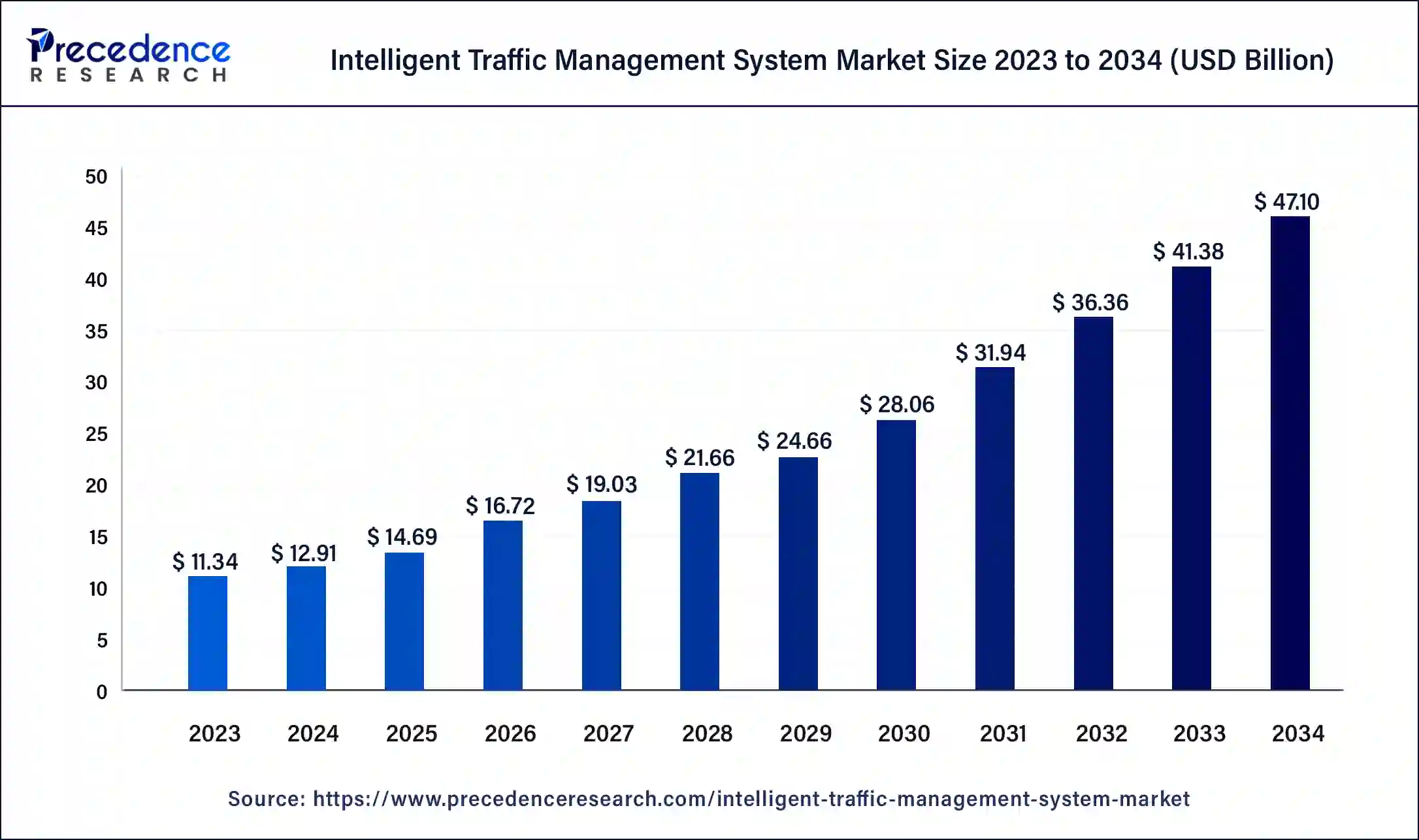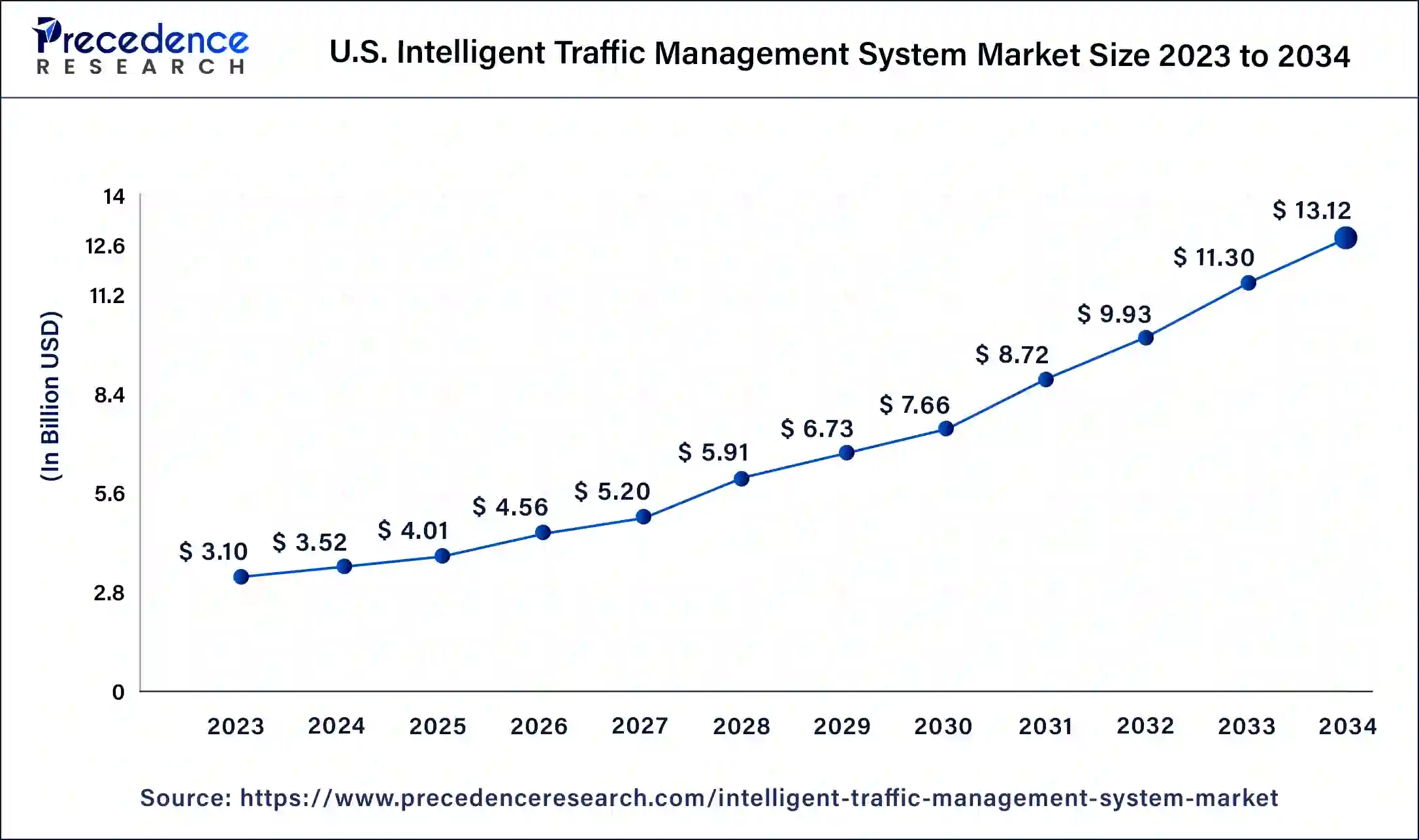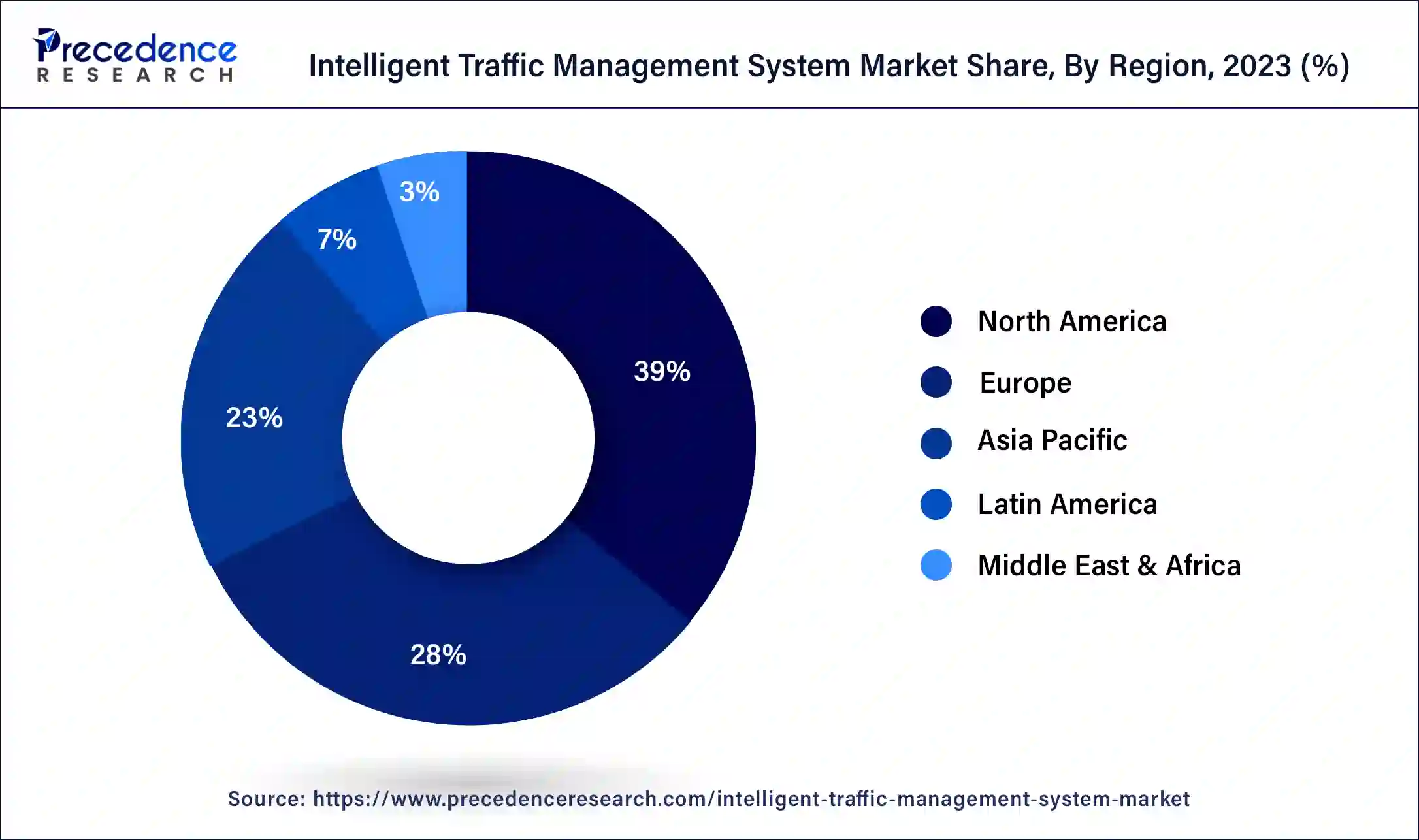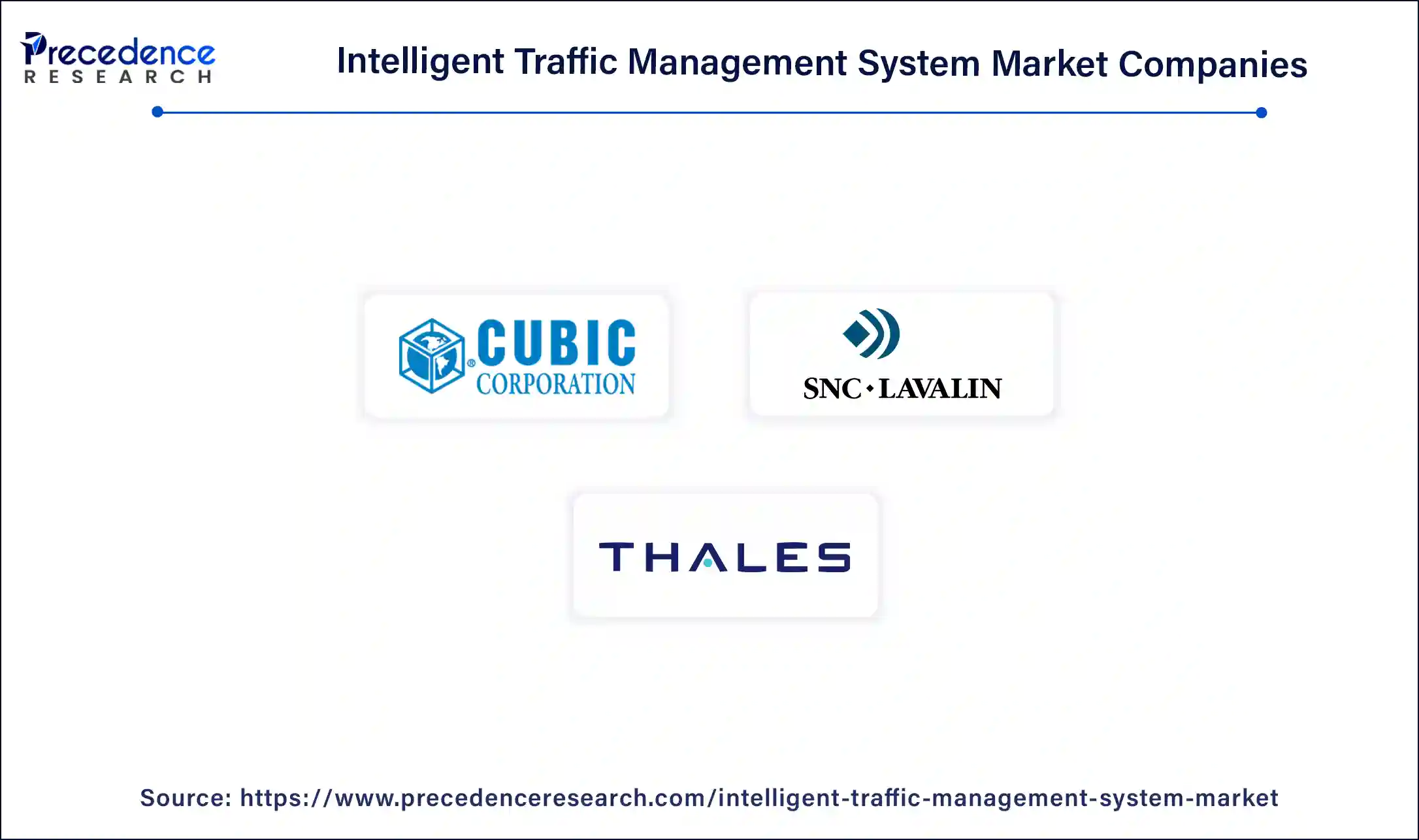November 2024
Intelligent Traffic Management System Market (By Solution: Traffic Monitoring System, Traffic Signal Control System, Traffic Enforcement Camera, Integrated Corridor Management, Intelligent Driver Information System, Others) - Global Industry Analysis, Size, Share, Growth, Trends, Regional Outlook, and Forecast 2024-2034
The global intelligent traffic management system market size was USD 11.34 billion in 2023, calculated at USD 12.91 billion in 2024 and is expected to reach around USD 47.10 billion by 2034. The market is expanding at a solid CAGR of 13.82% over the forecast period 2024 to 2034. The North America intelligent traffic management system market size reached USD 4.42 billion in 2023. Increased traffic congestion issues globally due to the proliferation of the automotive sector and advancements in vehicle needs to manage the flow of traffic on the road to avoid mishaps are the major factors driving the intelligent traffic management system market growth globally.

U.S. Intelligent Traffic Management System Market Size and Growth 2024 to 2034
The U.S. intelligent traffic management system market size was exhibited at USD 4.42 billion in 2023 and is projected to be worth around USD 18.60 billion by 2034, poised to grow at a CAGR of 13.95% from 2024 to 2034.

North America accounted to for the highest share of the global intelligent traffic management system market in 2023. North America dominates the intelligent traffic management system market due to several key factors. The region's advanced technological infrastructure, high levels of urbanization, and significant government investments in smart city projects create a conducive environment for ITMS deployment. The U.S. Department of Transportation actively promotes intelligent transportation solutions through various funding programs and initiatives aimed at improving traffic efficiency and safety.
Moreover, North America's strong presence of leading technology companies and a high adoption rate of advanced technologies such as artificial intelligence (AI), internet of things (IoT), and big data analytics contribute to the region's intelligent traffic management system market leadership. These factors, combined with a well-established transportation infrastructure, allow for the seamless integration of ITMS solutions.

Asia Pacific is anticipated to witness substantial growth in the intelligent traffic management system market during the foreseeable period. Countries like China and India are experiencing significant economic growth, leading to higher demand for advanced traffic management solutions to combat congestion and enhance road safety. Governments in the region are heavily investing in smart city projects and modernizing transportation networks.
Again, China's New Infrastructure Plan focuses on developing intelligent transportation systems as part of its broader strategy to boost urban efficiency and sustainability. Similarly, India's Smart Cities Mission aims to incorporate advanced technologies, including ITMS, to improve urban living standards. Technological advancements and the proliferation of IoT devices further drive market growth in Asia Pacific. The region's large population and expanding middle class also contribute to increased adoption of the intelligent traffic management system market.
The intelligent traffic management system market is witnessing significant growth, driven by increasing urbanization, rising vehicle ownership, and the need to reduce traffic congestion and enhance road safety. These systems utilize technologies like AI, IoT, and data analytics to optimize traffic flow, reduce travel time, and improve emergency response. Key components include traffic monitoring systems, adaptive traffic control systems, and integrated corridor management. Government initiatives and smart city projects are major catalysts, with substantial investments being made in ITMS to improve infrastructure.
North America leads the intelligent traffic management system market due to advanced technological adoption and high investment in smart transportation solutions. However, Asia Pacific is expected to exhibit the highest growth rate, fuelled by rapid urbanization and supportive government policies in countries like China and India. Challenges such as high implementation costs and data privacy concerns persist, but ongoing advancements in technology and increased funding are poised to address these issues, ensuring continued market expansion.
| Report Coverage | Details |
| Market Size by 2034 | USD 47.1 Billion |
| Market Size in 2023 | USD 11.34 Billion |
| Market Size in 2024 | USD 12.91 Billion |
| Market Growth Rate from 2024 to 2034 | CAGR of 13.82% |
| Largest Market | North America |
| Base Year | 2023 |
| Forecast Period | 2024 to 2034 |
| Regions Covered | North America, Europe, Asia-Pacific, Latin America, and Middle East & Africa |
The critical government
The major driver for the market would be, on a global scale, Government initiatives globally play a crucial role in driving the intelligent traffic management system market. These initiatives often involve substantial investments in smart infrastructure aimed at alleviating traffic congestion, enhancing road safety, and reducing environmental impacts. Smart city projects, funded by governments worldwide, integrate ITMS as a key component to create efficient, sustainable urban environments.
The European Union's Horizon program allocates significant funds for smart transportation solutions, including ITMS. Similarly, in the United States, the Department of Transportation’s Smart City Challenge encourages cities to adopt advanced technologies for traffic management. China’s New Infrastructure Plan also emphasizes the development of intelligent transportation systems, reflecting the government's commitment to modernizing urban infrastructure.
Mobility announced a collaboration with the city of Barcelona to implement a comprehensive ITMS. This project aims to enhance traffic flow, reduce emissions, and improve overall urban mobility. Barcelona’s initiative, part of the European Union’s broader smart city agenda, highlights the growing importance of the intelligent traffic management system market in urban planning and development.
Sluggish infrastructural growth
The major drawback of the intelligent traffic management system market is sluggish growth in infrastructural building programs poses a significant restraint to the intelligent traffic management system market. Economic downturns, budget constraints, and bureaucratic hurdles often delay or scale down infrastructure projects, directly impacting the deployment of advanced traffic management solutions. Even in developed regions, political and economic uncertainties can lead to cutbacks in public spending on infrastructure projects. These delays hinder the timely implementation of ITMS, slowing market growth.
Moreover, large-scale infrastructure projects require extensive planning, coordination, and approval processes, often leading to prolonged timelines. This sluggish pace can stymie the integration of intelligent systems into existing traffic management frameworks. In regions where infrastructure development is slow, the benefits of ITMS, such as reduced congestion, improved road safety, and lower emissions, are not fully realized, limiting the overall market potential.
In many developing countries, limited financial resources and competing priorities mean that infrastructural upgrades and the adoption of new technologies receive less attention. Inadequate structure support methodologies further impedetion. To overcome this restraint, increased investment and streamlined processes in infrastructure development are crucial to facilitate the broader implementation of intelligent traffic management systems, thereby driving market growth.
Integration of real-time data with analytics
The lucrative opportunity that the market holds is that real-time traffic information systems present a significant future opportunity for the intelligent traffic management system market. These systems provide up-to-the-minute data on traffic conditions, enabling drivers and transportation authorities to make informed decisions that enhance road efficiency and safety. For businesses, this can mean more efficient logistics and delivery operations.
Real-time traffic information systems leverage advancements in technologies such as the Internet of Things (IoT), big data analytics, and artificial intelligence (AI). By collecting data from various sources such as traffic cameras, GPS devices, and sensors embedded in roads they offer a comprehensive and dynamic view of traffic patterns. This information can be disseminated to drivers via mobile apps, in-car navigation systems, and variable message signs, helping to reduce congestion and travel time.
The integration of real-time data also allows for adaptive traffic signal control, optimizing traffic flow based on current conditions. This can lead to significant reductions in fuel consumption and emissions, aligning with environmental sustainability goals. Furthermore, real-time traffic information can enhance emergency response times by providing clear routes for emergency vehicles. Incorporating real-time traffic data into smart city frameworks offers substantial benefits, including improved urban mobility and better resource allocation.
Advanced sensor technology
The increasing availability and affordability of advanced sensor technology, coupled with growing urbanization and the demand for smart city solutions, underscore the potential for real-time traffic information systems to drive the future growth of the ITMS market, making cities smarter and more responsive to their inhabitants' needs. There is significant growth in the carbon fiber tape market.
Real-time traffic information systems leverage advancements in technologies such as the Internet of Things (IoT), big data analytics, and artificial intelligence (AI). These systems provide up-to-the-minute data on traffic conditions, enabling drivers and transportation authorities to make informed decisions that enhance road efficiency and safety.
By collecting data from various sources such as traffic cameras, GPS devices, and sensors embedded in roads they offer a comprehensive and dynamic view of traffic patterns. This information can be disseminated to drivers via mobile apps, in-car navigation systems, and variable message signs, helping to reduce congestion and travel time. The integration of real-time data also allows for adaptive traffic signal control, optimizing traffic flow based on current conditions. This can lead to significant reductions in fuel consumption and emissions, aligning with environmental sustainability goals.
The traffic monitoring system segment is estimated to hold the largest share of the intelligent traffic management system market globally. A traffic monitoring system helps enhance traffic flow, safety, and overall urban planning to provide space and convenience. These systems employ technologies such as cameras, various sensors, and radar to collect real-time data about traffic conditions, which is an essential component to managing the congestion of vehicles on the road to avoid and detect possible incidents early and to optimize traffic signals and rules.
These types of developments highlight the importance of stems and their dominance in the global intelligent traffic management system market. Moreover, the adoption of traffic monitoring systems is driven by their ability to provide accurate, real-time information, which helps authorities make data-driven decisions. The integration of AI and data analytics again enhances their efficiency, which allows for improvement.
The traffic signal control system segment is anticipated to grow at the highest CAGR in the intelligent traffic management system market in the coming years due to the utilization of advanced technologies like machine learning, IoT, and AI to actively manage and optimize traffic signals based on real-time data analysis. This adaptability minimizes congestion and reduces traveling time extended due to traffic, further enhancing overall road safety efficiency.

Segments Covered in the Report
By Solution
By Geography
For inquiries regarding discounts, bulk purchases, or customization requests, please contact us at sales@precedenceresearch.com
No cookie-cutter, only authentic analysis – take the 1st step to become a Precedence Research client
November 2024
July 2024
May 2025
May 2025